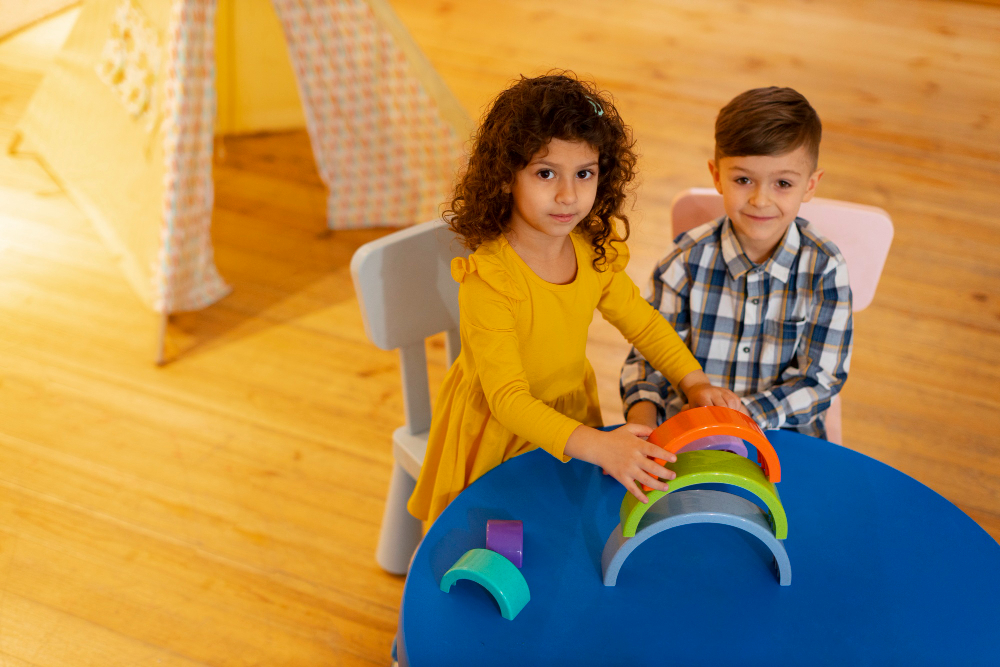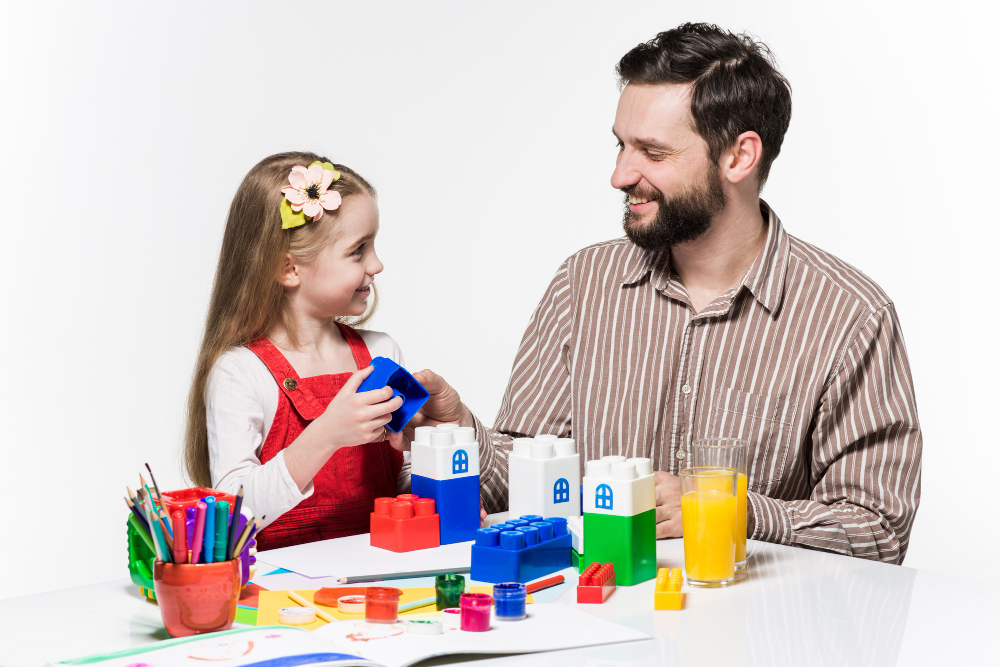
How Do You Guide Your Kid The Right Way?
Being a parent is a journey filled with joy, challenges, and countless decisions. One of the most important roles we have as parents is to guide our children in the right direction. But how do we do that? How do we navigate the complexities of parenthood to ensure our children grow up to be happy, healthy, and successful individuals? In this blog, we’ll explore some simple yet effective ways to guide your kid through life’s ups and downs.
Lead by Example
As parents, we are our children’s first and most influential role models. Our actions speak louder than words. If we want our children to develop positive habits and values, we must demonstrate them ourselves. Whether it’s kindness, honesty, perseverance, or resilience, our children learn by observing how we behave in various situations. So, guide your kid by being the person you want them to become.
Encourage Open Communication
Communication is key to any relationship, including the one with our children. Create an environment where your child feels comfortable expressing their thoughts, feelings, and concerns. Listen to them attentively without judgment and validate their emotions. By fostering open communication, you build trust and strengthen your bond with your child. This allows you to guide your kid effectively through life’s challenges.
Set Clear Expectations and Boundaries
Children thrive in environments with structure and consistency. Set clear expectations and boundaries for their behavior, and communicate them in a way that is age-appropriate and understandable. Be firm yet compassionate when enforcing these boundaries. Consistency is key in guiding your child toward understanding the difference between right and wrong.
Provide Love and Support
Unconditional love and support form the foundation of a child’s emotional well-being. Let your child know that you love them no matter what and that you are there to support them through thick and thin. Celebrate their successes, no matter how small, and offer comfort and encouragement during times of failure or disappointment. Your love and support will guide your kid through life’s ups and downs with confidence.
Teach Problem-Solving Skills
Life is full of challenges, and it’s essential to equip your child with the skills they need to navigate them successfully. Teach them problem-solving skills by encouraging them to think critically, explore different solutions, and learn from their mistakes. Guide your kid through the process of making decisions and facing consequences, allowing them to develop resilience and independence along the way.
Encourage Exploration and Curiosity
Children are naturally curious beings who learn best through exploration and discovery. Encourage your child to explore their interests, try new things, and ask questions about the world around them. Foster a love of learning by providing them with opportunities for hands-on experiences and engaging activities. By nurturing their curiosity, you guide your kid toward a lifelong journey of growth and discovery.
Lead with Empathy and Understanding
Empathy is the ability to understand and share the feelings of others. Teach your child the importance of empathy by demonstrating compassion, kindness, and understanding towards others. Encourage them to consider different perspectives and to treat others with respect and empathy. By leading with empathy, you guide your kid toward becoming a caring and compassionate individual who makes a positive impact on the world.
Be Patient and Flexible
Parenting is not always easy, and there will be times when you feel frustrated or overwhelmed. It’s essential to be patient with yourself and with your child as you navigate the ups and downs of parenthood. Be flexible in your approach, willing to adapt and adjust as your child grows and develops. Remember that parenting is a journey, and mistakes are a natural part of the learning process. Guide your kid with patience and flexibility, knowing that you are doing the best you can.
In conclusion, guiding your child through life is a journey that requires patience, love, and dedication. By leading by example, encouraging open communication, setting clear expectations, providing love and support, teaching problem-solving skills, fostering exploration and curiosity, leading with empathy, and being patient and flexible, you can help your child navigate life’s challenges with confidence and resilience. So, embrace the opportunity to guide your kids and watch them flourish into the amazing individuals they are meant to be.

The Importance of Play for Kids; Explained!
When it comes to the mental well-being of children, play is indeed essential. It enables them to dip into the world around them, understand where they are suited, and develop the critical skills they require to flourish. Not only is play an excellent education tool, but likewise a terrific way for households to bond and have fun jointly. However, despite its importance, some parents might struggle to discover the time to let their kids play willingly or might not know how to integrate more play into kids’ routines.
In this post, we’ll delve into the importance of play for kids and why play is so vital during childhood!
What Is Play?
In our day-to-day talks, we toss around the word ‘play’ to cover an entire bunch of stuff we do. Whether it’s shooting hoops, rolling dice, or engaging ourselves in make-believe worlds, we’re all about play. But psychologists and educators get a bit more specific about it.
Play? It’s all about being spontaneous, keeping us on our toes, letting us take the reins, and, of course, having a fun blast.
The Importance of Play for Kids
How children learn, develop, and make sense of the planet near them. So, let’s off-load the importance of play for kids:
Learning Through Play
Did you know that play is one of the most powerful forms of kid’s learning? Whether they’re creating buildings with blocks, forming fantastic worlds with dolls, or pretending to be superheroes, play helps children develop important skills like problem-solving, originality, and essential thinking. It’s like their very own classroom, but way more fun!
Social Skills
Playtime isn’t just about toys and games- it’s likewise about interaction. When kids play jointly, they learn valuable social skills like cooperation, sharing, and compassion. They practice taking turns, negotiating conflicts, and understanding additional viewpoints. These are skills that will serve them well throughout their lives, both in school and beyond.
Physical Health
In today’s world of screens and passive activities, play furnishes a much-needed possibility for kids to get moving and stay active. Whether it’s running around in the backyard, riding bikes with friends, or playing tag at the park, physical play is crucial for evolving motor skills, strength, and coordination. Plus, it helps keep those little bodies healthy and strong.
Emotional Well-being
Play isn’t solely good for kids’ bodies- it’s good for their minds and hearts too. Engaging in play helps kids express their emotions, reduce stress, and build strength. It’s a secure space where they can explore their feelings, work through challenges, and develop confidence in themselves and their abilities.
So, what can you do to promote more play in your child’s life? It’s simple, really- just let them play! Provide them with plenty of prospects for amorphous playtime, both indoors and outdoors. Stock up on toys, games, and art supplies that spark their imagination and creativity. And most importantly, join in the fun! Play with your kids, laugh with them, and cherish these precious moments of childhood magic.
In conclusion, the importance of play for kids is not simply a fanciful pastime- it’s an essential aspect of childhood development. By prioritizing play in your child’s life, you’re giving them the gift of learning, growth, and happiness. So, go ahead, let them play- and watch as they blossom before your eyes.

10 Best Parenting Tips for Preschoolers
If you’re reading this, chances are you’re navigating the exciting, albeit challenging, journey of raising a preschooler. As a parent, the endless energy, the barrage of questions, and the constant need for attention can be overwhelming at times. But fear not! With a little patience, love, and some tried-and-true parenting tips, you can foster a nurturing environment that helps your preschooler thrive. So, let’s dive into the 10 best parenting tips for preschoolers:
Establish a Routine
Preschoolers thrive on predictability, so establishing a consistent daily routine can work wonders. From wake-up time to bedtime, try to stick to a schedule for meals, playtime, and other activities. This helps your little one feel secure and know what to expect throughout the day.
Encourage Independence
One of the best parenting tips for preschoolers is encouraging independence. Preschoolers are eager to assert their independence, so give them opportunities to do so! Encourage them to dress themselves, pour their own cereal, and pick out toys to play with. Allowing them to make choices and take on small responsibilities boosts their confidence and fosters a sense of autonomy.
Practice Positive Reinforcement
Praise and encouragement go a long way in shaping your preschooler’s behavior. When they exhibit positive behavior such as sharing or using manners, be sure to praise them for their efforts. Positive reinforcement reinforces good behavior and helps build a strong parent-child bond.
Set Clear Boundaries
While it’s essential to encourage independence, setting boundaries is another best parenting tips for preschoolers. Let your preschooler know what behavior is acceptable and what isn’t, and be consistent in enforcing rules. Consistency helps your child understand expectations and promotes a sense of security.
Promote Emotional Intelligence
Preschoolers are learning to navigate their emotions, so help them develop emotional intelligence by validating their feelings and teaching them healthy ways to express themselves. Encourage them to talk about their feelings and model positive coping strategies like taking deep breaths or using calming techniques.
Foster Creativity
Preschoolers have vivid imaginations, so foster their creativity by providing plenty of opportunities for imaginative play. Stock up on art supplies, encourage storytelling, and engage in pretend play together. Creative expression not only stimulates your child’s imagination but also enhances cognitive development.
Limit Screen Time
While screens can be a convenient distraction, it’s essential to limit your preschooler’s screen time, and is one of the best parenting tips for preschoolers. The American Academy of Pediatrics recommends no more than one hour of high-quality screen time per day for children ages 2 to 5. Instead, encourage active play, reading, and hands-on activities to promote healthy development.
Encourage Exploration
Preschoolers are natural explorers, so encourage their curiosity by providing opportunities for hands-on learning and discovery. Take nature walks, visit museums, and engage in sensory activities that stimulate their senses. Encouraging exploration fosters a love of learning and helps your child develop critical thinking skills.
Practice Patience
Parenting a preschooler can be challenging, but practicing patience is key. Remember that your child is still learning and growing, so try to approach challenging situations with empathy and understanding. Take a deep breath, count to ten if you need to, and respond calmly rather than reacting impulsively.
Make Time for Quality Time
Amidst the hustle and bustle of daily life, don’t forget to carve out quality time to connect with your preschooler. Whether it’s reading a bedtime story, baking cookies together, or simply snuggling on the couch, spending one-on-one time with your child strengthens your bond and creates lasting memories.
These are the ten best parenting tips for preschoolers. Parenting a preschooler is a rewarding journey filled with love, laughter, and endless learning opportunities. So, embrace the adventure, cherish the moments, and remember that you’re doing an amazing job!

How Can Parents Involve Their Families In Fitness?
In the hustle and bustle of daily life, discovering time for family fitness can seem like a challenge. However, incorporating physical activity into your family routine not only promotes a healthy lifestyle but also creates lasting memories. Here are five easy and enjoyable ways for parents to involve their families in fitness.
Create a Family Fitness Challenge
Turn exercise into a friendly competition! Set achievable fitness goals for each family member, such as the number of steps taken in a week or the time spent being active. Create a chart to track everyone’s progress and celebrate achievements together. This not only fosters a sense of accomplishment but also encourages teamwork and motivation.
Outdoor Adventures
Explore the great outdoors as a family. Whether it’s a weekend hike, a bike ride, or a simple game of catch in the backyard, outdoor activities provide a fun and refreshing way to stay active. Choose activities that everyone can enjoy and tailor them to your family’s interests. It’s not just exercise; it’s an adventure!
Make Chores Fun
Housework doesn’t have to be a bore! Turn daily chores into a fitness routine by incorporating movement. For example, crank up the music and dance while cleaning, or challenge each family member to a “speed cleaning” race. Not only does this keep your living space tidy, but it also transforms mundane tasks into lively family moments.
Family Fitness Classes
Joining a fitness class together can be a fantastic way to bond as a family. Look for activities like family yoga, dance, or even martial arts classes. Many communities offer family-oriented fitness options, making it a great opportunity to connect with other families while staying active. Plus, learning new skills together can be both educational and entertaining.
Tech Time with a Twist
Embrace technology in a way that promotes movement. Invest in interactive video games that encourage physical activity, such as those that involve dancing or sports simulations. Turn screen time into a family affair by playing together. Just be mindful of the duration to balance screen time with other activities.
Incorporating fitness into family life doesn’t have to be a chore. By making it fun, interactive, and tailored to your family’s interests, you can create a healthy and active lifestyle that everyone will enjoy. Remember, the goal is not just to get moving but to build lasting connections and foster a love for fitness that will benefit your family for years to come. So, lace up those sneakers, grab your water bottles, and embark on a fitness journey that’s as joyful as it is beneficial!
